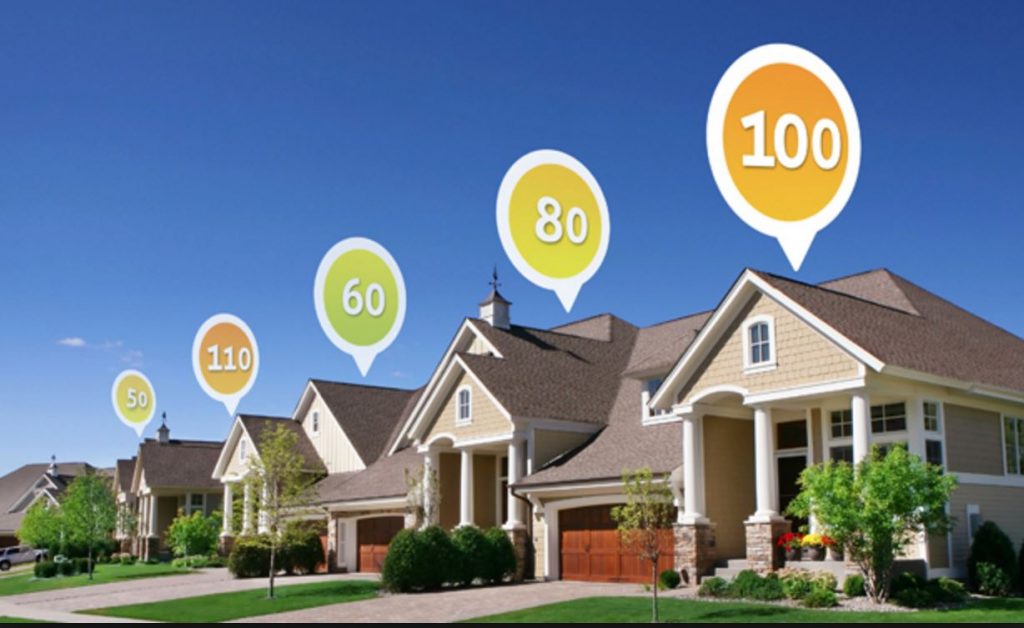What is a HERS Score and Why is it Important?


A HERS Rating Can Say a lot About a House
The HERS Index or, the Home Energy Rating System is simply an analysis of a home’s energy efficiency per the HERS Index. This index is the nationally recognized scoring system for measuring a home’s energy performance. Many cities and some states either require or will be requiring that the test to determine a HERS Index Score be completed on a newly constructed home. In many cases, there are certain certification programs that require a specific HERS Score be attained to meet a specified certification level. However, most states and cities don’t have a required rating. You can look at the HERS Index Score as a sort of miles-per-gallon (MPG) sticker for houses. It can give prospective homeowners an insight as to how the home ranks in terms of energy efficiency. A HERS Index Score can also provide other insights into a home’s energy issues. The home energy rating process provides the homeowner with a detailed report regarding energy problems in the house.
- The amount and location of air leaks in the building envelope
- The effectiveness of insulation inside walls and ceilings
- The amount of leakage from HVAC distribution ducts
- Any existing or potential combustion safety issues
Related: BUILDING SCIENCE MAKES YOUR NEW HOME BETTER
There are several other variables taken into account during a rating review that includes:
- Windows and doors, vents and ductwork
- Floors over unconditioned spaces (like garages or cellars)
- Water heating system and thermostats
- Attics, foundations and crawlspaces
How Does a Home Energy Rating Work?
 A certified Home Energy Rater assesses the energy efficiency of a home assigning it a relative performance score. It is one of the most in-depth energy performance assessments that can be performed on a home. Diagnostic tests are performed using specialized equipment. Some of the equipment used includes a blower door test, a duct leakage tester, a combustion analyzer and infrared cameras.
A certified Home Energy Rater assesses the energy efficiency of a home assigning it a relative performance score. It is one of the most in-depth energy performance assessments that can be performed on a home. Diagnostic tests are performed using specialized equipment. Some of the equipment used includes a blower door test, a duct leakage tester, a combustion analyzer and infrared cameras.
To calculate a home’s HERS Index Score, a certified HERS Rater does an energy rating on your home and compares the data against a “reference home”. The “reference home” is based on a model home that is same shape and size of the home that is being rated. This means that the score will be relative to the home being evaluated.
An energy efficient home conforming to the 2004/2006 International Energy Conservation Code (IECC) has a HERS Index Score of 100. What this means is that homes with lower scores are more energy efficient and those with higher scores are not energy efficient. The U.S. Department of Energy has determined that a typical existing or used home scores 130 on the HERS Index. For example:
- A home with a HERS Index Score of 70 is 30% more energy efficient than a standard new home
- A home with a HERS Index Score of 130 is 30% less energy efficient than a standard new home
The rating process can tell you a lot about the home, such as how efficiently it’s operating and where modifications can be made for greater energy savings. When it is time to sell your home, a low HERS Index Score can bring a higher resale price. Knowing the HERS Index score can also help you anticipate the costs of the home’s energy bills and efficiency upgrades.
Energy Efficient Mortgages
Energy Efficient Mortgages (EEMs) are essentially mortgages that credit a home’s energy efficiency in the home loan. EEMs recognize that reduced utility expenses can permit a homeowner to pay a higher mortgage to cover the cost of the energy improvements on top of the approved mortgage. They can allow the borrower a greater debt-to-income ratio, thereby giving the home buyer the ability to buy a higher quality home due to lower monthly heating and cooling costs.
The HERS Index is the standard used to measure a home’s energy efficiency. A certified Home Energy Rater conducts inspections to verify the home’s energy performance and determine the improvements that can be made to increase it.
What is a Net Zero Home?
A Net Zero home has a HERS Index Score of 0. This means that this home produces as much energy through renewable resources as it consumes. It can do this through solar panels, geothermal heating/cooling, wind mills, etc. Only a Net Zero Energy Home can score 0 on the HERS Index. Some of the advantages of a Zero Energy Home include:
- Increased comfort and better health: a Net Zero Energy Home is designed to reduce temperature fluctuations.
- Environmental sustainability: a Net Zero Energy Home protects the environment by reducing cutting carbon emissions, reducing greenhouse gasses, and saving energy.
- Cost effective: a Net Zero Energy Home creates its own energy which virtually eliminates energy bills.
What Can a HERS Rating Do for Me?
The major benefit of using the HERS Index score is that it provides a standard by which to measure the efficiency of any home and compare it to another home. When designing a new home, homeowners aren’t aware that they can design in energy efficiency by using modern building techniques such as modular construction to increase the performance of their new home. The cause of high utility bills in many cases may not lie in over usage of electricity but performance issues with the house that are inherent with traditional building methods.
The post What is a HERS Score and Why is it Important? appeared first on Impresa Modular.




